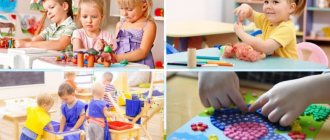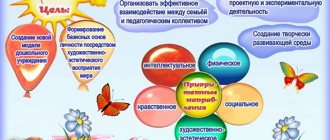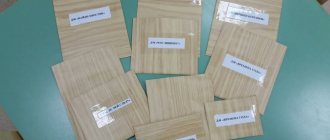Increasing the professional competence of preschool teachers. material on the topic
Improving the professional competence of preschool teachers.
The Law “On Education of the Russian Federation” classifies preschool education as the first level of general education. Along with such functions as child care and supervision, preschool organizations are assigned the obligation to carry out educational activities, which are allocated as a separate service. In education, the task is to achieve a new, modern quality of preschool education associated with the creation of conditions for the development of the personality of each child, capable of realizing himself as a part of society. In this regard, new content is expected for the professional and pedagogical activities of preschool teachers, their readiness to master and implement innovations that are in demand by the educational situation.
The leading role in ensuring the effectiveness of the educational process is played by the teacher and his professionalism.
In the Federal State Educational Standard for Preschool Education in clause 3.4.2. it is stated that “teaching staff implementing the Program must have the basic competencies necessary to create conditions for the development of children.” In addition, the Professional Standard of a Teacher, approved by order of the Ministry of Labor and Social Protection of the Russian Federation dated October 18, 2013 No. 544n, reveals the general requirements for a teacher (education, work experience, special conditions) and labor actions, skills and knowledge necessary for performing the general pedagogical function of teaching, raising and developing children, as well as the requirements specifically for a preschool teacher. In accordance with them, one of the labor actions of a teacher (educator) is the development of professionally significant competencies necessary for him to solve the educational problems of the development of children of early and preschool age, taking into account the age and individual characteristics of their development.
The concepts of “professional competence” and “competence” are currently being considered in the works of various scientists and specialists. There is no consensus on the definition of these concepts and in many studies these concepts are identical. So, let's look at these concepts.
Competence is personal and interpersonal qualities, abilities, skills and knowledge that are expressed in various forms and situations of social life. Competence means a person’s possession of appropriate competence, including his personal attitude towards it and the subject of activity. Professional competence is understood as a set of professional and personal qualities necessary for successful teaching activities. The development of professional competence is the development of creative individuality, sensitivity to pedagogical innovations, the ability to adapt to a changing pedagogical environment and make decisions in each specific situation when organizing the pedagogical process in a preschool educational institution. In other words, competencies are goals, and competencies are results. And achieving a goal always contributes to development. Likewise in pedagogy, by updating his competencies, the teacher develops and his professional competence grows. The quality level of upbringing and development of a preschool child depends on how competently the educational process is structured in a preschool institution.
The quality of education is a social category that determines the effectiveness of the educational process in preschool educational institutions, its compliance with the needs and expectations of society in the development of children and the professional competence of teachers. Belaya K.Yu. proposes the following content of this concept: “The quality of preschool education is such an organization of the pedagogical process in a kindergarten in which the level of education and development of each child increases in accordance with his personal age and physical characteristics in the process of upbringing and training.” And, of course, the quality of work of a preschool educational institution depends on:
1. On the quality of teachers’ work.2. The relationships that have developed within the teaching staff.3. Conditions created in the preschool educational institution for the creative search for new methods and forms of working with children.
4. Objective assessment of the performance of each employee.
Thus, quality is the result of the activities of the entire teaching staff. It is also important that each participant in the educational process must be able to interact with other members of the team in order to become like-minded people. Those. the need for priority of the teacher’s subjective position in relation to himself is revealed, which allows him to be personally responsible for the level (quality) of his professionalism. Then he himself determines what, when and in what form he should do in order to change himself and influence the results of his work (and therefore the results of the work of the preschool institution). With this approach, the emphasis is on the professional and personal growth of the teacher, on the process and result of this growth, and the search for effective forms of work and means of ensuring this growth.
K.D. Ushinsky said: “In the matter of teaching and upbringing: nothing can be improved without going past the teacher’s head.” One of the important conditions for the successful work of a teacher in a modern educational institution is the feeling of not only responsibility for one’s work, but also internal freedom in work. The teacher must become an independent, educated professional, taking full responsibility for everything he does, and become the center of the process of improving the quality of preschool education. The implementation of this task can contribute to the formation of professional growth and mobility of teachers to the new or updated content that appears in kindergarten, and also helps in the rapid development of new types of activities.
Professional growth of a teacher is the goal and process of the teacher acquiring knowledge, skills, and methods of activity that allow him to optimally realize his mission, solve the tasks facing him in training, education, development, socialization and preservation of the health of students (M. M. Potashnik, academician Russian Academy).
In pedagogy there are two concepts: “professional” and “personal growth of a teacher.” How do they influence each other? They exist in close interaction. Therefore, it is correct to talk about the professional and personal growth of a teacher as positive changes, the development of professional and personal qualities. The development of professional and personal growth of a teacher is a priority area of methodological work.
Innovative methods of work of a senior educator with preschool teachers
The connection between the content of methodological work and the results of teachers’ work ensures a continuous process of improving the professional skills of each educator. At the same time, methodological work is of a proactive nature and is responsible for the development and improvement of all work with children, in accordance with new achievements in pedagogical and psychological science. Therefore, it is impossible to agree with the understanding of methodological work as only a service for correcting errors in the activities of the educator, although in the course of it these problems also have to be solved. The main thing is to provide real, effective and timely assistance to teachers. However, the problem of improving the professional skills of each preschool teacher is quite complex. Traditional forms of methodological work, in which the main place was given to reports and speeches, have lost their importance due to their low efficiency and insufficient feedback. Today it is more effective to use active forms of work, which are characterized by the involvement of teachers in activities and dialogue, involving a free exchange of opinions.
Innovative methodological work is part of professional, managerial, pedagogical activities, the distinctive features of which are:
1. ensuring the operation of the educational institution in development mode;
2. selection of the content of methodological work that ensures the personal development of a preschool child and his self-development;
3. providing teachers with information about innovative facts and phenomena and organizing expertise;
4. equipping teachers with methods of professional pedagogical activity that create an effective impact on the personal development of the child.
Objectives of methodological work:
— increasing the level of theoretical and psychological training of teachers;
— formation of an innovative orientation in the activities of the teaching staff based on the study, generalization and dissemination of advanced pedagogical experience;
— study of new educational programs, educational state standards;
— study of new regulatory documents, instructional and methodological materials, assistance to teachers in self-education,
— assistance in mastering information and communication technologies.
Consequently, improving professional competence coincides with the objectives of methodological work.
According to Belaya K.Yu., it is important to determine real indicators of work to improve the professional competence of teachers, to formulate evaluation criteria - these are:
1) the skill of teachers, expressed in increasing qualification categories;
2) growth of creative activity of teachers in methodological work at various levels;
3) children's health indicators;
4) level of development of children.
Preschool teachers face a difficult task - to teach and develop students in accordance with standards, without forgetting about the individuality and personal development of each child. It is not without reason that in the Federal State Educational Standard for Preschool Education special attention is paid to the development of students through play, free conversation, dialogue, through communication with peers, older children, family, and teachers. The teacher must take a partnership position, comprehend new things together with the child in the form of cognitive, research, project activities, and in the form of creative activity.
Expected results:
— Providing information, methodological, and technological readiness for teachers to work with children in accordance with the Federal State Educational Standard for Educational Education.
— Increasing the level of formation of motivational and professional competence of preschool teachers: developing new values, principles of interaction and communication with preschoolers.
— Expanding the opportunities and needs of teachers to improve their professional competence through the use of various forms of advanced training.
— Improving the quality of education in preschool educational institutions.
Based on the above, work with teachers to improve the professional competence of teachers is carried out in the process of:
— self-educational work;
— mastering information and communication technologies;
— improving the teacher’s project culture.
Self-education is an important link in the holistic system of methodological work, a complex and creative process of teachers’ independent comprehension of methods and techniques of working with children.
In the context of the implementation of the Federal State Educational Standard for Education, within the framework of the professional standard of a teacher, an integral part of teaching activity is the continuous improvement of one’s professional qualifications and continuous self-education.
External events can be used as incentives to support activity: training in courses, attending various seminars, methodological associations, getting to know the experience of other teachers, etc. The opportunity to participate in innovative activities helps stimulate interest in work.
For teachers with an active position on self-development, a great incentive is to work on trust, the opportunity to exchange experience with colleagues, and the offer to work in depth in one or another area of educational work with children. Only a system of activities that involves an active form of learning and interaction between teachers in kindergarten - workshops, trainings, consultations, conversations - can minimize such hindering factors as one’s own inertia and inability to manage one’s time.
Self-development of a teacher is a central link in the successful development of a preschool institution, the preschool education system as a whole and the teacher himself, his level of professional and technological competence because It is the teacher who ensures the effective functioning and development of the educational institution.
Mastery of information and communication technologies
As practice shows, it is no longer possible to imagine a modern kindergarten without new information technologies. Proficiency in ICT allows one to increase the efficiency of the educational process and contributes to improving the professional competence of teachers. To date, teachers have created personal websites in the “Electronic Education in the Republic of Tatarstan” system, are adding to their portfolios, and preparing presentations that help generalize and disseminate their work experience.
Teacher’s project culture as part of professional competence
The project activity of preschool teachers is one of the methods of developmental training and self-education, aimed at developing research skills (posing a problem, collecting and processing information, conducting experiments, analyzing the results obtained), promotes the development of creativity and logical thinking; combines the knowledge gained during the methodological activities of the preschool educational institution and in advanced training courses.
The goal of project activities is to create conditions for innovative activities in preschool educational institutions, the use by teachers of knowledge, skills and abilities acquired in professional activities.
Topics for teachers to develop projects and mini-projects are chosen independently depending on the creative direction of activity. At the final stage of the activity, a presentation is made. The purpose of the presentation is:
— providing teachers with the opportunity for public speaking and self-expression;
— increasing motivation and interest in professional activities; prestige of project implementation;
— training teachers in the ability to present their work;
— training of teachers in the technology of project activities.
The development of a project culture in the educational process contributes to the cohesion of the teaching staff and the harmonization of relationships with students and their parents.
A variety of forms and methods for developing the competence of teachers.
Of the many forms and methods used in working with teachers, aimed at developing competence, the following can also be identified:
1. Seminar – creative classes are aimed at developing creative thinking and creating innovative projects.
2.Game modeling. Business and role-playing games involve modeling a real process, during which optimal professional decisions are made based on the analysis of artificially created pedagogical situations. A business game as a teaching method allows you to “live” a particular practical situation.
3. Collective solution of problem situations, group discussion, or brainstorming; trainings in small groups to improve professional skills; methods of self-educational work, scientific and practical conferences on the results of innovative activities of preschool educational institutions.
4. A new form that allows us to comprehensively solve basic practical and research problems and integrate various educational forms of training is the scientific and methodological council. The work of the scientific and methodological council includes a creative group of teachers, the scientific director of the experimental site, the head of the preschool educational institution and a senior teacher.
The competence of his activities includes the creation of a team of like-minded people for the development of the institution, which develops a strategy, constructive and methodological schemes for the implementation of the general concept, a model of the institution and its main structures, methods for studying the cultural, educational and professional needs of all participants in the pedagogical process. An important place in the content of the work of the scientific and methodological council is occupied by the analysis of the activities of the institution, the results of the use of new pedagogical technologies, analysis of the professional activities of team members, consideration of prognostic programs and projects, analysis and approval of didactic and methodological materials, generalization of experience.
Important in the work of the scientific and methodological council is the analysis of innovative methods and techniques, their implementation in the sociocultural space, and the study of their influence on the degree of development of the child.
5. Pedagogical ring - guides teachers to study the latest research in psychology and pedagogy, methodological literature, helps to identify different approaches to solving pedagogical problems, improves the skills of logical thinking and argumentation of their position, teaches conciseness, clarity, accuracy of statements, develops resourcefulness and a sense of humor . This form provides criteria for evaluating responses, speeches and actions of participants:
• general erudition;
• professional knowledge, abilities, skills;
• ability to get out of a difficult situation, impromptu.
6. A business game can be used not only as a test lesson based on the results of a theoretical seminar on a problem relevant to a preschool educational institution, but also when developing solutions to a new problem. For example: “Is it easy to be a preschooler? »
7. A bank of ideas is a rational way of collectively solving problems that cannot be solved by traditional methods at this stage. For example: “Ecology of play: how to bring play back into the life of a kindergarten.” An effective form is to hold an exhibition - a fair of pedagogical ideas, an auction. Properly prepared and carried out, it stimulates teachers to creativity and self-education. Therefore, the main result of the exhibition-fair is a noticeable professional and personal growth of educators. Thanks to this form of work with teachers, conditions are created for the public presentation of the best examples of their professional activities, the emergence of new ideas, and the establishment and expansion of business and creative contacts with colleagues.
8. Master class. Its main goal is to get acquainted with teaching experience, the system of work, the author’s findings and everything that helped the teacher achieve the best results.
9. Another form that can be used before open events for educators and parents is the teacher’s mindset for successful work - “Quick Setup”:
1. If you want people to like you, smile! A smile, a ray of sunshine for the sad, an antidote created by nature from troubles.
2. You are the best and most beautiful, let all the fashion models in the world envy you.
3. There are people like a gold coin: the longer they work, the more
are more valuable.
4. There is no better beloved friend than your favorite job: she doesn’t get old, and
does not allow you to grow old.
5. Difficulties strengthen you on the path to happiness.
In addition, forms of methodological work aimed at developing the competence of teachers to implement the Federal State Educational Standard in a preschool educational institution are: - organizing individual and group consultations in order to provide methodological assistance to teachers (it is very important to get feedback from teachers, to discuss exactly those issues that cause difficulties );
— organizing the activities of the “creative group”;
— training seminars on the issues of Federal State Educational Standards of Education (a productive form of advanced training for teachers: they focus on improving their theoretical training).
— holding open events to exchange experience in teaching activities with teachers of the region, district, city (studying the best practices of teachers allows us to solve a number of problems, such as the targeted accumulation of pedagogical materials, analysis of activity results, description of interrelated work in a certain area).
Thus, the use of these and other active forms and methods of teaching in the process of improving the professional skills of preschool teachers ensures the practice-oriented nature of the educational process, promotes inclusion in innovative activities, and the formation of the need for continuous professional improvement.
In the course of methodological work to improve the professional competence of teachers, it is possible to determine the direct dependence of the quality of education and upbringing in a preschool institution on the level of professional competence of teaching staff. The higher the level of professional competence of teachers, the higher the level of quality of education in preschool educational institutions.
In modern conditions of education reform, the status of the teacher and his educational functions are radically changing, and the requirements for his professional and pedagogical competence and the level of his professionalism are changing accordingly. Today, a teacher who is creative, competent, and capable of developing the skills to mobilize his personal potential in the modern system of education and development of preschoolers is in demand.
A teacher is:
1. A harmoniously developed, internally rich personality, striving for spiritual, professional, general cultural and physical perfection.
2. Able to select the most effective methods, means and technologies of training and education for the implementation of assigned tasks.
3. Able to organize reflective activity.
4. Possessing a high degree of professional competence, a teacher must constantly improve his knowledge and skills, engage in self-education, and have a variety of interests.
To summarize, we can say that a well-constructed system of innovative forms of work with teaching staff will lead to an increase in the level of educational work in preschool educational institutions and will unite the team of teachers. The main thing is to find the “key” for each teacher.
List of used literature
- Arabadzhi V.A. Creative search in working with teachers // Preschool educational institution management. 2010. No. 3
- Belaya K.Yu. Methodological work in preschool educational institutions: analysis, planning, forms and methods. M.: Creative Center, 2005.
- Volobueva L.M., Mirenko I.A. Active teaching methods in the methodological work of preschool educational institutions // Preschool educational institution management. 2006. No. 6.
- Order of the Ministry of Education and Science of the Russian Federation dated October 17, 2013. No. 1155 “On approval of the federal state educational standard for preschool education.”
- Pashkevich T.D. Petrusevich V.V. Professional competence of preschool teachers. // Management of preschool educational institutions.2010. No. 3.
- Yakovleva G.V. Management assistance to teachers in innovative activities. //Management of preschool educational institution. 2007. No. 6.
How does the system of advanced training for educators work according to the law?
Advanced training is one of the forms of additional professional education (DPE). The teacher periodically takes specialized courses that give him new knowledge and professional skills in his favorite profession. By law, educators are required to improve their qualifications at least once every 3 years. The duration of such training must exceed 16 academic hours.
Only those educators who have a certain level of education can take advanced training courses:
- Higher pedagogical education
- Secondary specialized education in the field of pedagogy
If a teacher does not have a specialized education, instead of advanced training courses, he can take professional retraining courses. They belong to a different type of DPO.
A teacher can take advanced training courses at his own request or at the request of the management of preschool institutions. If management assigns training, they must pay for these courses and choose the topic. The teacher himself can suggest a topic that he is interested in understanding. And then the head decides whether to follow his own teaching plans or take into account the wishes of the preschool teacher. If a teacher wants to take a course, but does not have a referral from the employer, he pays for the training himself.
Where can I take advanced training courses?
Different types of institutions provide the opportunity to take advanced training courses. The most popular of them:
- Special centers and institutes of additional education They teach on various topics of a narrow and general focus. Typically, teachers and developers of such institutions are practitioners, that is, they actually know what it is to work with children. Therefore, they convey teaching experience, and not just theoretical knowledge, which is rare in modern education. An example of such an institution is ABiUS, which has been providing educational services for 20 years.
- On the basis of higher educational institutions. Candidates and doctors of sciences who are engaged in research and development in the field of additional education teach at such institutions. Most programs are only available in offline format.
- Research institutes, laboratories and research centers They offer a large selection of short-term courses. The emphasis in these courses is on the theoretical part.
When choosing a course, it is important to make sure that the course program complies with the Federal State Educational Standard and professional standards. If it does not meet these standards, then difficulties may arise.




